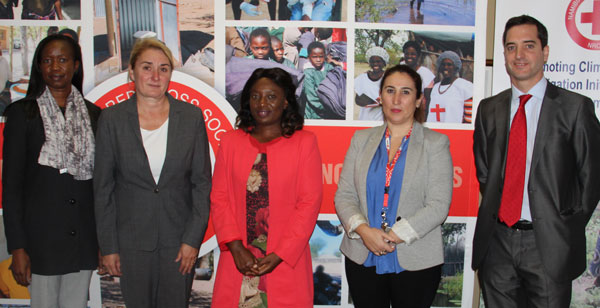
EU contributes to the mitigation of negative impacts of climate change

The Promoting Renewable Energy for Climate Change Mitigation Initiatives in Namibia received funding from the EU and Ambassador to Namibia H.E. Jana Hybaskova last week said that the EU is playing a facilitating role to foster national discussions on an appropriate energy mix and support country resilience.
The project covers a period of 24 months, starting March 2017 ending February 2019. The total budget of the project, approx. N$7 million of which 80% is funded by the EU and 20% by the Spanish Red Cross.
The main intent of the intervention is to contribute to mitigating the negative impact of climate change within rural vulnerable communities in Namibia by promoting the use of renewable forms of energy and energy efficient technologies in 10 selected rural communities in Kavango East and West and Zambezi regions.
Climate change experts say that rural communities and economies still coming out of the industrial age or promoting growth of the primary sector are more prone to extreme weather patterns and a changing climate.
Namibia Red Cross Society, being the larger humanitarian organisation in the country aimed at empowering the resilience of vulnerable communities in Namibia, in partnership with Spanish Red Cross has been awarded the proposal from the European Union. Experts say that climate change effects
Hybaskova said that the funding towards the project can be set to a number of areas that are very important for further cooperation such as the status of Namibia’s Renewable Energy Strategy and efforts at decentralization.
Deputy Head of Mission, Ander Ruiz said that the 15th anniversary of the collaboration between Namibia Red Cross Society and Spanish Red Cross, is an acknowledgement of the success of the projects both organizations have implemented in matters of health and food security through the years.
Ruiz said that the relationship which has brought a difference and development to the various communities where the projects are being implemented are a primer for the next new EU Project round, which he emphasized is focused more on the importance of the innovation component of the actions, and mostly the pertinence and good timing, because of the vulnerable situation coming from the negative impact of Climate Change.
Raising awareness on renewable energy and energy efficient technologies in the targeted areas. The setting up of solar pumping system for the agricultural production to improve the sustainable supply of irrigation water coupled with drip irrigation systems that efficient enable water use, the use of solar lighting at household level and the development and introduction of improved cooking energy efficient stoves.
Namibia has the advantage of a young generation that is entering the Renewable Energy market while at the same time improving the economic status of the rural women. Clear policies and objectives can be found in the country’s 5th National Development Plan, the Harambee Prosperity Plan as well as international goals that vouch for Namibia determination to have 70% of its energy needs covered by renewable energy in 2030.
Being a country that imports 60% of its energy, which translates in higher prices and less development, Ruiz said is important to replicate the project in other areas of the country as well and ensure that the country used its abundant sun exposure to increase its energy production as well as adopting innovative and more environmentally friendly ways of cooking and energy generation.
There is a commitment from Namibia in the 2015 United Nations Climate Change Conference, COP 21, for the year 2030 to improve the situation. The Head of mission offered further collaboration with Spain in Renewable Energies, a field the country has success in, being the second leading producer of wind energy in Europe and the third one in solar energy
Acknowledging that some Spanish companies are already working in renewable energies in Namibia in addition to Spain being one of the main players in the renewable energy sector with leading country expertise and market players in wind power generation.
Namibia is considered to be highly vulnerable to the impacts of climate change, due to its geographic location, its variable weather patterns, and a number of socio-economic factors. In addition it is currently not able to generate ample electricity to meet its needs and as a result is importing nearly 60% of its electricity from countries in the region, much of which is generated from fossil fuels.
This energy dependency has clear risks for Namibia. In order to both reduce energy dependency on its neighbours and to address climate change, government has prioritized climate mitigation actions, especially the generation of clean and renewable energy.
Taking action on climate change is a key priority as well for the EU which looks to support both adaptation and mitigation actions in Namibia. Under the mitigation component, the EU supporting Namibia to reduce its vulnerability of the rural population to the adverse impacts of climate change is currently at the fore.












































